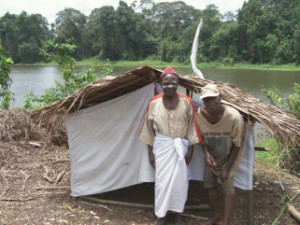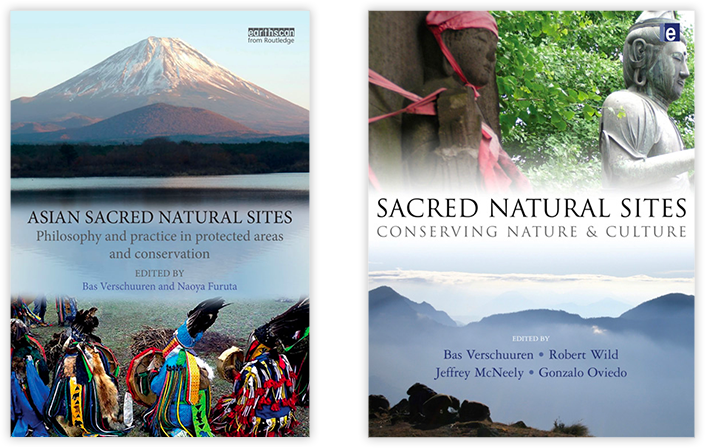
Katika delta ya Niger, watu wa Biseni na Osiami wanaishi pamoja kwa amani na mamba wa eneo hilo. Maziwa yalikuwa mamba wanaoishi maziwa yanahesabiwa kuwa matakatifu na mamba wanaonekana kama ndugu wa Bisini na Osiami. Wakati wowote mamba akifa hupata mazishi kama mwanadamu. Kuwepo kwa ushirikiano huu kunatishiwa na ushawishi unaokua wa masilahi ya kiuchumi ya kimataifa kama vile mafuta na uvuvi ina athari kubwa kwenye maisha, maadili na mazoea ya watu wa ndani na wa asili katika delta.

Kuhani na Msaidizi mbele ya kaburi lililowekwa kwa dhabihu kwa mungu wa Ziwa katika Ziwa Esibiri (Tulikuwa). Sadaka zinazofanywa kwenye kaburi ni lazima na hufanya kazi muhimu kabla na baada ya sherehe za uvuvi. Picha: D.E.. Wazi.
Mamba ni kama kaka yetu, Na kwa hivyo haiwezi kuumizwa
-Anonymous Osiami
Uwepo wa kuongezeka kwa mataifa pia huathiri utawala wa kiikolojia wa maliasili katika mkoa na kutishia ikolojia. Kazi zaidi inamaanisha watu zaidi na watu zaidi huongeza mahitaji ya samaki. Kama watu wa ndani wanalazimishwa kupitisha mitindo isiyoweza kudumu ya uvuvi ambayo hutoa mapato zaidi, kama uvuvi wa baruti, Tabia zao za jadi za uvuvi endelevu zimeachwa. Mfumo wa uvuvi wa jadi hutenganisha maziwa katika vikundi viwili: zile ambazo zinaweza kuingizwa, na zile ambazo haziwezi kuingizwa. Aina hizo zinazunguka ili kudumisha usawa kati ya mahitaji ya samaki ya watu wa asili na wakati inachukua kwa mfumo wa ikolojia kurejesha idadi ya samaki.
Utafiti huu wa kesi ni msingi wa uzoefu wa MS. Eno Anwana ambaye amefanya kazi na vikundi vya asilia katika mkoa huo kwa zaidi 15 miaka. Kwa habari zaidi juu ya wavuti hii na ushirikiano kati ya watendaji Soma uchunguzi kamili wa kesi kwenye tovuti yetu.
Kwa: Rianne Doller






